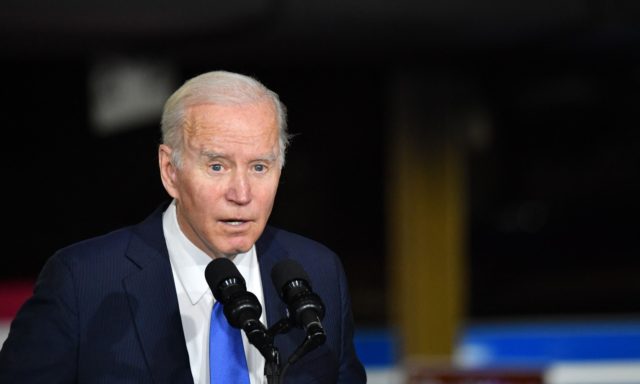Most Americans are not buying the Biden administration’s claims that its Build Back Better social welfare spending bill will combat inflation, a poll released Thursday showed.
Fifty-one percent of Americans say they are pessimistic that the bill would reduce inflation, an NPR/Marist poll showed. Just 35 percent say they are optimistic, with 15 percent undecided.
President Biden has repeatedly claimed that passing the $1.85 trillion Build Back package of tax breaks and spending programs, including a massive tax break for owners of expensive homes in high tax states, would help relieve inflationary pressures. Biden has touted a letter from 17 Nobel Prize-winning economists who indicated that the bill could “ease long-term inflationary pressures.”
The American public, however, is unconvinced. The primary concern is not over long-term inflationary pressures. Over the longterm, inflation is already expected to ease thanks to many of the same factors that kept inflation ultralow in the years following the financial crisis. The concerns about high and accelerating inflation are over the deterioration of household buying power and the rise in the cost of living in the near and medium-term.
Americans may also be turning a skeptical eye at the claim because it seems so opportunistic. The bill was being touted on completely different grounds before inflation became a major political headache for the Biden administration. And now that inflation is seen as the number one economic problem, the Biden administration announces the programs it was already pushing for will also fight inflation.
A few weeks ago, White House press secretary Jen Psaki falsely claimed that no economists were projecting the bill would add to inflation.
“[N]o economist out there is projecting that this will have a negative impact on inflation. And actually, what it will help do is it will help increase economic productivity. It will help economic growth in this country. That, and the Build Back Better Agenda will help reduce inflation, will help cut costs for the American people over the long term,” Psaki said during a press briefing.
In fact, many economists think the Build Back Better bill will add to inflation in the near term, with any deflationary pressure arising far off into the future, if ever. At a panel last month sponsored by the National Association for Business Economics, three economists—White House favorite Mark Zandi at Moody’s Analytics, Douglas Holtz-Eakin of the American Action Forum and Harvard University professor Doug Elmendorf—said that passing the bill would add to inflation next year, although they disagreed about how much inflationary pressures would increase. That’s largely because much of the spending and tax-breaks front-loaded, while the tax hikes and possibly supply chain relief would take years to kick in.
Republicans are expectedly very downbeat about the prospects that the bill will fight inflation, with 76 percent in the pessimistic column. But a majority of independents—55 percent—say they are pessimistic. Only 56 percent of Democrats say they are optimistic, with 26 percent saying they are pessimistic and 19 percent saying they are unsure.

COMMENTS
Please let us know if you're having issues with commenting.